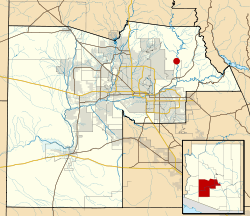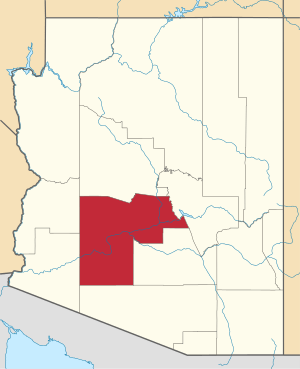Rio Verde, Arizona
Rio Verde is a census-designated place (CDP) in Maricopa County, Arizona, United States. It is a master planned community. The population was 1,811 at the 2010 census.
Rio Verde | |
|---|---|
 Location of Rio Verde in Maricopa County, Arizona. | |
 Rio Verde Location in the United States  Rio Verde Rio Verde (the United States) | |
| Coordinates: 33°43′20″N 111°40′36″W | |
| Country | United States |
| State | Arizona |
| County | Maricopa |
| Area | |
| • Total | 5.05 sq mi (13.08 km2) |
| • Land | 5.04 sq mi (13.06 km2) |
| • Water | 0.01 sq mi (0.01 km2) |
| Elevation | 1,617 ft (493 m) |
| Population (2010) | |
| • Total | 1,811 |
| • Estimate (2016)[2] | N/A |
| Time zone | UTC-7 (Mountain (MST)) |
| ZIP code | 85263 |
| Area code(s) | 480 |
| FIPS code | 04-60250 |
| GNIS feature ID | 0037065 |
History
The area surrounding the Rio Verde community, northeast of Scottsdale, was settled by small farmers in the 1880s, who grew hay and alfalfa to provide for the nearby Fort McDowell[3] US Army camp (1865–1890) (now the Fort McDowell Yavapai Nation[4]). In the late 1890s, Frank Asher and William W. Moore acquired several of the small farm plots on the Verde River, combining them into what became the Box Bar Ranch; Moore later bought out Asher's interest. After his death in 1929, Moore's sons, Glen and Lin Moore, operated the Box Bar as a partnership, under the name "Moore Bros Cattle Co.", with grazing leases both east and west of the Verde River. Lin Moore also ran the X2 Ranch, known as "Moore's Well", 12 miles (19 km) to the west, where he and his wife, Ada Lucille, had homesteaded in the 1920s. William Moore's father, Ransom B. Moore, had emigrated to Arizona from California in 1883 and ranched for many years on the Reno Ranch, just west of the community of Punkin Center, Arizona. Ransom Moore, founder of what is now Banning, California, also served as Gila County's delegate to the 16th Arizona Territorial Legislative Assembly in 1891.
The "Asher Hills" were named for Frank Asher, who had been Glen Moore's brother-in-law and William Moore's partner for a time. The granddaughter of Asher's wife Ella, Jacque Mercer, was selected as Miss Arizona and then Miss America in 1949. There is now an Asher Hills Road in far North Scottsdale, AZ.
In 1954 the Moore brothers retired from the active cattle business and sold the ranch and their holdings to the Page Land & Cattle Co. (Lin Moore retained the X2 Ranch; after his death in 1960, his widow continued to operate the X2 until selling it in 1970). The Moores' descendants, including historian Wyatt James, still reside in Maricopa County. A portion of Lin & Lucille Moore's homestead property on the foothills to the south, known as "The Ochoa Place" has recently been incorporated into the expanding McDowell Mountains McDowell Sonoran Preserve.
In 1970, Page Land & Cattle sold ranch land to Rio Verde Development, Inc., which in 1973 began to develop the tract as the master-planned community of Rio Verde.[5] An 18-hole golf course was completed in 1973, and a second in 1981. Both were extensively renovated in 2007.
Community characteristics
Rio Verde is an established, member-owned and governed active adult golfing community. Its location near the Verde River and adjacent to the Tonto National Forest, the McDowell Mountain Regional Park, and the Yavapai Nation Indian Reservation provides a scenic setting for golf and "a whole lot more". There are 980 households in the 735-acre low density community.
Rio Verde is the home of the Rio Verde Country Club. The private club's two 18-hole championship courses were recently renovated by the Tom Lehman Design Group. The goal was to have two distinct layouts: the Quail Run tract is similar to Midwestern park-style courses, while the White Wing course is more of a links style layout with wide chipping areas around the greens. There are extensive practice facilities. The club house has two restaurants, a banquet facility, and a pro shop.
The Rio Verde Community Center has a library, exercise facilities, card rooms, an art studio, a dance studio, etc. The community also has 6 lighted tennis courts and a newly renovated swimming pool. Rio Verde's location provides a gateway to hiking, biking, horseback riding, and other sport/outdoor activities.
Rio Verde Community Church provides both interdenominational and Catholic services.
Rio Verde is an age-restricted community" or "adult community," which means one member of each household must be at least 55 years of age and no person under 19 can be a permanent resident of the community.[6]
The community is governed by a homeowners' association under Arizona's planned community statutes.[6][7]
Geography
Rio Verde is located at 33°43′20″N 111°40′36″W (33.722236, −111.676673).[8]
According to the United States Census Bureau, the CDP has a total area of 5.4 square miles (14 km2), all of it land.
Demographics
| Historical population | |||
|---|---|---|---|
| Census | Pop. | %± | |
| U.S. Decennial Census[9] | |||
Rio Verde is a census-designated place (CDP). As of the census[10] of 2000, there were 1,419 people, 761 households, and 634 families residing in the CDP. The population density was 261.9 people per square mile (101.1/km2). There were 1,168 housing units at an average density of 215.5/sq mi (83.2/km2). The racial makeup of the CDP was 99.65% White, 0.07% Native American, 0.14% Asian, 0.07% from other races, and 0.07% from two or more races. 0.28% of the population were Hispanic or Latino of any race.
There were 761 households, out of which 0.1% had children under the age of 18 living with them, 82.8% were married couples living together, 0.4% had a female householder with no husband present, and 16.6% were non-families. 15.5% of all households were made up of individuals, and 13.0% had someone living alone who was 65 years of age or older. The average household size was 1.86 and the average family size was 2.02.
In the CDP, the population was spread out, with 0.1% under the age of 18, 0.1% from 18 to 24, 1.3% from 25 to 44, 36.1% from 45 to 64, and 62.4% who were 65 years of age or older. The median age was 69 years. For every 100 females, there were 91.8 males. For every 100 females age 18 and over, there were 91.9 males.
The median income for a household in the CDP was $86,248, and the median income for a family was $96,909. Males had a median income of $93,859 versus $60,357 for females. The per capita income for the CDP was $58,783. None of the families and 1.7% of the population were living below the poverty line, including no under eighteen and 2.1% of those over 64.
References
- "2016 U.S. Gazetteer Files". United States Census Bureau. Retrieved July 18, 2017.
- "Population and Housing Unit Estimates". Retrieved June 9, 2017.
- Fort McDowell, Arizona Archived December 3, 2007, at the Wayback Machine
- Fort McDowell Yavapai Nation
- Scottsdale Real Estate, North Scottsdale Real Estate, Maricopa County Real Estate, Jenny Pradler
- The Verdes Rio Verde and Tonto Verde
- Rio Verde Archived August 27, 2006, at the Wayback Machine
- "US Gazetteer files: 2010, 2000, and 1990". United States Census Bureau. February 12, 2011. Retrieved April 23, 2011.
- "Census of Population and Housing". Census.gov. Retrieved June 4, 2016.
- "U.S. Census website". United States Census Bureau. Retrieved January 31, 2008.
